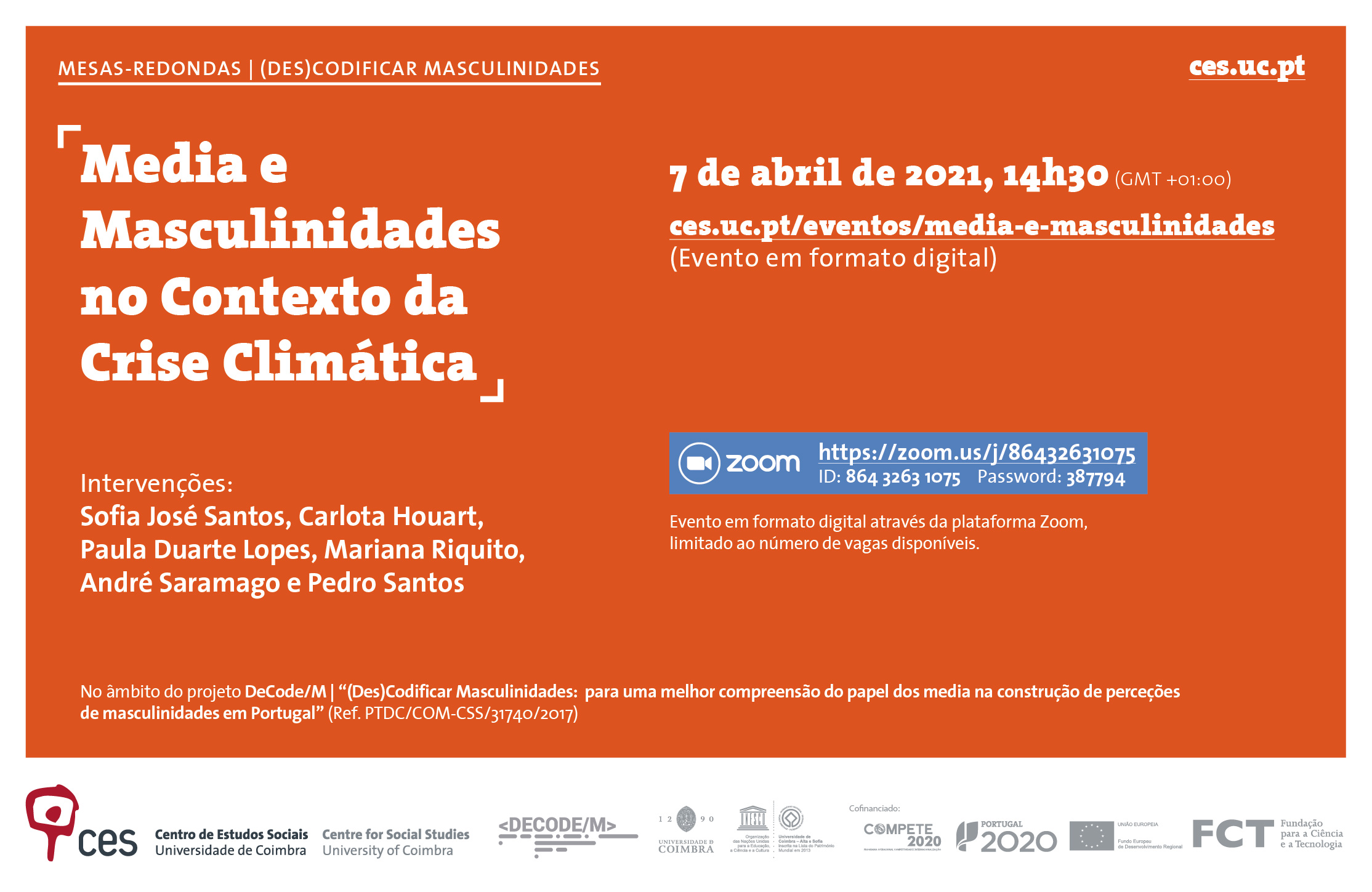Roundtable | (De)coding Masculinities
Media and Masculinities in the Context of the Climate Crisis
April 7, 2021, 14h30 (GMT +01:00)
Online event
About
This event is the 2nd roundtable discussion of the DeCode/M project's "Decoding Masculinities" Roundtable and intends to address the connections between the constant worsening of the climate crisis; the preponderant role of certain individuals/elites, who embody particular traits of hegemonic masculinities, in this worsening; and the way the media has identified and represented (or not) these connections.
In recent years, a growing body of research has sought to understand the relationships between particular types of masculinity and how these have influenced representations and perceptions of the climate crisis, and subsequent policy action. Different terms, such as 'industrial masculinity' (Anshelm and Hultman, 2014) or 'petro-masculinity' (Daggett, 2018), have entered this debate in an attempt to synthesise the political, economic and identity links between a mainly male, conservative, white elite with a strong presence in politics, finance and industry, who lead the sectors most responsible for the climate crisis and who tend to support climate denialism; and the climate crisis, which, although already present throughout the world and with increasingly severe and visible impacts, has not had a concerted or effective response from the political and economic elites. In turn, media representations of environmental issues, events and actors have tended to be gendered, activating and/or recovering imaginaries of femininities and masculinities in the treatment of ecological issues, and impacting the way men and women in the (inter)national context interpret and act on environmental issues. Some media have, similarly, already begun to talk about the links between particular types of masculinity and the rejection of climate science (or tackling the climate crisis); the attacks on prominent climate activists (such as Greta Thunberg) being mainly protagonised by conservative white men; or the fact that men, statistically, behave less ecologically than women - themes explored in several articles published in online media between 2017 and 2020.
This roundtable will then spark a debate around these issues, seeking to answer questions such as: a) Why is it that, statistically, people who identify as climate deniers or who reject green policies and/or behaviours tend to be men with politically conservative leanings, and white? b) Why have public attacks on climate activists such as Greta Thunberg, who is young and female, been led primarily by this same group of individuals, and how is this related to the fact that climate justice agendas pose a threat to the very identity of these individuals? c) Why is it critical to explore the development of counter-hegemonic male identities that foster a greater respect for the environment, a greener lifestyle, and that support climate and gender justice? d) How has the media represented (or not) the climate crisis and environmental problems in their connection to gender issues? e) How has the media conveyed or contested the idea that the climate crisis is mainly a scientific, technological and political domain, and that it consequently concerns more male leaders and experts? f) How can the media contribute to a diversification of climate and environmental discourses and actors, and how important would it be - in this sense - to give more centrality to the gender issue in the climate and environmental debate?
Programme
14h30 - 14h45 – Introduction to DeCode/M (Sofia José Santos) and the Environment and Climate Change thematic area (Carlota Houart)
14h45 - 15h45: 10 minutes comments by each of the speakers: Carlota Houart; Paula Duarte Lopes; Mariana Riquito; André Saramago; Pedro Santos.
15h45 - 16h30: Q&A
________________________________
This activity will be accessible through the Zoom platform and will be limited to number of available places:
https://us02web.zoom.us/j/86432631075?pwd=dlBVOXpDckxtODVjOWhkN1Nocmludz09
ID da reunião: 864 3263 1075 | Senha de acesso: 387794
We appreciate that all participants keep the microphone muted until the moment(s) of debate. The host of the session reserves the right to expel the participant who does not respect the rules of the room.
Online open access activities such as this one do not grant a declaration of participation since such document will only be provided in events that provide for prior registration and controlled access.


